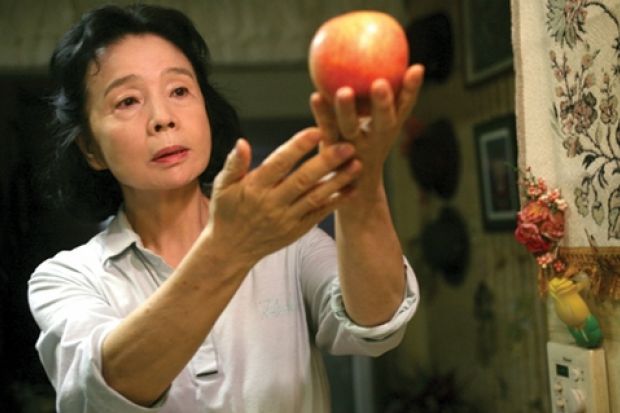Poetry
Directed by Lee Chang-dong
Starring Yun Jung-hee, Ahn Nae-sang and Kim Hi-ra
Released in the UK on 29 July
One test of a good film is whether it lurks in the imagination days after being seen. Another is the extent to which it enlists its audience in the act of constructing its fiction. Poetry is a success in both departments.
It concerns an aged grandmother, Mija (played by veteran Korean actress Yun Jung-hee), who scrapes a living looking after elderly stroke victim Mr Kang (Kim Hi-ra), a randy old goat who takes Viagra before she gives him a bath. She is disgusted by this, but cannot survive without the money she needs to look after her useless teenage grandson, Wook (Lee David). In her spare time she attends a poetry-writing class but is told by her doctor that she has Alzheimer's, the first casualty of which will be her command of language. A few weeks later she makes a terrible discovery: Wook is one of a group of six boys guilty of raping a 15-year-old schoolgirl, driven to suicide by shame.
All right, the plot sounds contrived, melodramatic and sentimental. The entire thing ought to have been a disaster, but isn't. On the contrary, Poetry is a triumph. I've been trying to work out why; it has a great deal to do with the underplaying of Yun, who is in nearly every scene. She incarnates her character as a kindly disposed woman whose fate is to be ill used by her employer, patronised by her doctors and betrayed by those closest to her. This is done with a quiet poise that grounds the character in the real rather than in some fictional world of make-believe. She internalises her suffering, as we do in life, rather than "acts" it out.
The scene in which she expresses disbelief at the news that she has dementia, purely with her eyes, is representative. In fact, Yun's face is the most compelling visual feature of the entire film. The skill with which she draws us into Mija's inner world - her quiet dignity, her refusal to allow the world to destroy her, and most of all her moral compass - is one reason why Poetry never lapses into second-order drama. It is naturalistic playing of a high order.
Another element is its pacing. Its director, Lee Chang-dong, has allowed Yun time and space in which to explore her responses, and because she is such a fine actress the result is arresting, even disturbing. In one scene she sits by the river in which the schoolgirl committed suicide; it begins to rain, the rain turns into a storm, and Yun remains seated, vulnerable and alone. It is an intense moment and a powerful piece of acting, even though the actress is not apparently doing anything. The film has a running time of two hours and 20 minutes, but every second is full of event, even when there is no action.
Thematically, the film opposes the making of poetry, equated with the search for beauty, to the squalid, selfish, dark side of human nature which is everywhere to be seen, most obviously in the male characters who are driven by sexual need and the pusillanimous desire to conceal their misdemeanours. This isn't merely a moral distinction; Yun's creative spirit is fundamental to her essential character. "To have poetry is to have flowers in your heart," she remarks.
In its unassuming way, Poetry argues that such people can find no resting place in the world. Yun can no more bring her knuckle-headed grandson to an understanding of his misdeeds than she can instil an appreciation of poetry in the brutalised sensibilities that surround her. As Philip Larkin would have put it, Yun "was too good for this world".
After seeing this film, I pondered its echoes. The girl who drowns herself dimly recalls Ophelia, but the strongest literary precursor is Lear. Like him, Yun is in danger of losing her faculties, a threat that overshadows her throughout. And, like Lear, she awaits the moment at which the young will take her for granted and throw her to the wolves. But there is nothing pretentious about this film. It is a beautifully executed meditation on the human spirit, with expertise to match its ambitions.
Register to continue
Why register?
- Registration is free and only takes a moment
- Once registered, you can read 3 articles a month
- Sign up for our newsletter
Subscribe
Or subscribe for unlimited access to:
- Unlimited access to news, views, insights & reviews
- Digital editions
- Digital access to THE’s university and college rankings analysis
Already registered or a current subscriber? Login
